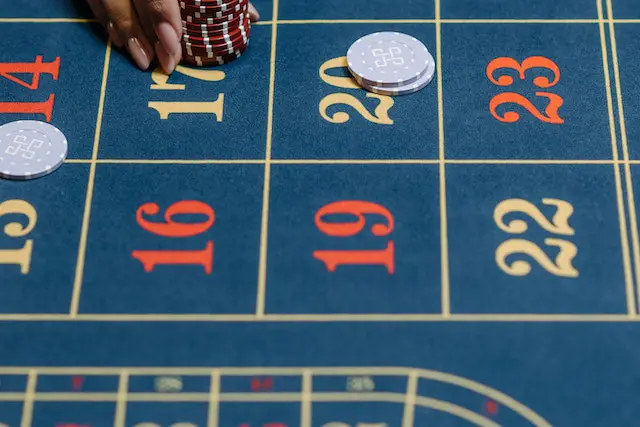What Does 1u Mean In Betting?
In betting, “1u” refers to one measurement unit for betting purposes. Gamblers utilize the idea of the unit to calculate the amount they bet based on their overall bankroll. They can manage their risk and place bets of the appropriate amount according to their belief in a specific outcome.
The value of a unit varies between individuals and is usually a percentage of a person’s bank account. For instance, if someone has a $1,000 bank account, when they decide that one dollar is 1 percent of their account, 1 unit will be equivalent to $10. In this instance, bet 1u is a bet of $10.
Using units rather than fixed dollar amounts can provide a more flexible strategy for betting. It can be altered according to the bettor’s belief in a particular bet. For example, if a person is more certain about the outcome they want, they could place bets of 3 or 2 units instead of only 1. In contrast, they can prefer 0.5 and 0.25 units if they’re less confident.
Utilizing the concept of units, gamblers can effectively manage their cash flow and minimize the risks of gambling. This allows for consistency in betting patterns and helps avoid making impulsive choices that could result in significant financial losses. Using units offers a systematic betting method, encouraging responsible gambling habits and long-term viability in sports.
What Does Mean To Handicappers Betting?

Unit Definition
When it comes to handicappers’ betting in the handicapping market, a unit (abbreviated by the abbreviation “u”) represents a standard measurement used to calculate a bet’s value. It allows handicappers to create an enduring and sustainable gambling strategy based on trust in a specific bet.
Bankroll Management
Handicappers utilize devices to control their bankrolls effectively. A bankroll is the sum of money that is set aside for betting. When assigning a price to any unit, handicappers can place bets in proportion to the size of their bankroll. For example, if a handicapper’s account is worth $1,000, they could decide that one unit is one percent of their bankroll, or $10.
Relative Wager Size
Handicappers employ units to describe the amount of money they bet in relation to their confidence level. The typical unit size (e.g., 1 u) is usually considered the standard or default bet size for handicappers. If they’re certain about a bet, they can place one-unit bets.
Adjusting Unit Size
Handicappers can alter the size of their unit according to their perception of the bet’s value or anticipated outcomes. If they’re more confident about the outcome of a bet, they could increase the size of their unit to reflect their greater confidence level. For instance, they may place a bet of 22 or 3 on a bet they believe has a higher chance of winning. In contrast, if they feel that they do not have confidence in the bet, they might reduce the unit size to limit the risk, for instance, by betting 0.5 u5 u instead of 0.25 u.
Consistency and Long-Term Profitability
Utilizing units can help handicappers keep a consistent betting strategy regardless of their funds. This prevents impulsive gambles and ensures that bets are made in a planned and regulated manner. By adhering to a standard amount of units and a strategy, handicappers can assess their performance over time and make informed changes to boost their profit.
Responsible Gambling
The idea of units encourages responsible gambling habits. By establishing a unit’s size based on the amount of money they have, handicappers stay clear of placing too large bets that could affect their financial security. This helps to ensure a long-term approach to betting and can help handicappers avoid losing money or becoming too confident.
In the end, for gamblers who have handicaps, “1u” represents a standardized unit of measurement that is used to measure the size of bets. It helps in the management of bankrolls, allows for relative bet sizes, and promotes consistent and responsible gambling methods. Handicappers can alter the size of their unit according to their confidence level in a specific bet to maximize long-term success and profitability.
What Exactly Is A Unit Of Betting?

Definition of a Unit
In the field of gambling, the term unit refers to a specific measurement that is used to calculate the amount of a bet. It’s an adaptable and reliable method for gamblers to manage their money and assess their bets’ risk and potential reward.
Bankroll Management
One of the main reasons for betting units is to aid in efficient bankroll management. A bankroll is the total amount of money set aside for betting. When assigning a value to each bankroll, gamblers can place bets in proportion to the size of their bankroll, giving them better control over the amount of money they wager.
Percentage of Bankroll
They are usually expressed as a percentage of the bettor’s total bankroll. The exact percentage may differ depending on the individual’s gambling strategy, level of risk, and overall financial condition. For example, if a person has a $1,000 bankroll and decides that one unit is one percent of their money, it will be equivalent to $10.
Flexibility in Wager Sizing
Using units allows for flexibility in betting sizes based on the bettor’s confidence level with the particular bet. The unit size (e.g., 1 u) usually represents a standard or default size for wagers. Bettors can adjust their betting amounts by scaling up and down the size of the unit to show their confidence in the result. For instance, they could place a bet of 2 or 3 u on a higher probability of success or 0.5 or 0.25 u on a riskier bet.
Consistency and Risk Management
They help gamblers maintain consistency with their betting strategies. With a standard-size unit, they can precisely assess and compare the potential profits or losses of different bets. This consistency enables better risk management and avoids emotional decisions based on emotional or short-term fluctuations.
Performance Evaluation
Another benefit of betting with a unit is that it allows bettors to analyze the performance of their bets over time. By tracking their bets in units, they can evaluate their success rates, profitability, and investment returns (ROI). It is a standard measurement to assess the efficiency of their betting strategies and make necessary adjustments.
Responsible Gambling
The idea of units encourages responsible gambling. By allocating bets according to the percentage of their bankroll, bettors can be protected from the dangers of placing bets that are too large, which could result in significant financial losses. Units encourage a controlled and long-term betting method, stressing the importance of focusing on long-term profit rather than seeking short-term gains.
In short, an element of betting is a common measurement used to calculate a bet’s amount. It helps in the management of bankrolls. It allows various options for sizing wagers according to confidence levels, encourages the consistency of risk management, aids in performance evaluation, and promotes responsible gambling. By including units in their betting strategies, gamblers can improve their overall experience betting and their odds of longevity success.
What Is The Most Appropriate Size Of The Betting Unit?

Deciding on the ideal size of the unit to bet on can be based on various variables, including the individual’s desires, risks, and financial conditions. Although there isn’t a standardized size that will work for all, here’s an in-depth description of the most important aspects of determining the ideal size of the unit:
Bankroll Assessment
Before you decide on the size of your unit, it’s important to determine your financial situation. Estimate the total amount of money you will allocate specifically to betting. The size of your unit should be a small portion of your bankroll to ensure you have enough money to fund your betting in the long run.
Risk Tolerance
Take note of your risk tolerance. If you’re more cautious with a smaller risk, you can choose smaller units. However, if you’re happy with higher risks and possibly more extreme swings in your money, choosing an even larger size is possible.
Percentage of Bankroll
The most common strategy is to define a unit’s size in percentages of your total bank account. The percentage you assign can be different based on your risk tolerance. A typical interval is between 5 and 10 percent of your total bank balance per unit. If, for instance, your account balance is $1,000, the 22% unit is $20.
Confidence Level
Your confidence level in the particular bet will affect the size of your unit. If you’re confident and have a high amount of faith, you may consider increasing your unit size for the specific bet. If you’re unsure or not sure about a bet, then you could opt for smaller units.
Long-Term Sustainability
The most important aspect of choosing the right size unit is to ensure long-term sustainability. You should avoid overly aggressive bets that can result in substantial losses and a reduction in your bankroll. Finding the right balance between a size that will yield meaningful returns and one that safeguards your money from significant risks is crucial.
Tracking and Evaluation
Consistency is crucial when betting on units. By keeping track of your bets and outcomes in units, you will be able to evaluate the performance of your bets in a precise manner. This lets you assess the return on your wagers and adjust the size of your unit over time.
Adaptability and Flexibility
Be aware that the ideal size for your unit can change depending on your betting and bankroll improvement. It’s important to be flexible and adjust the size of your unit as needed. If your account balance is soaring or declining, it could be necessary to review and adjust the size of your unit accordingly.
In short, the most appropriate size for a betting unit depends on factors like your risk tolerance, bankroll levels, confidence levels, and long-term sustainability goals. Analyzing these variables and determining the amount of your account as a unit will give you a solid base. It’s also important to track and modify the size of your unit to keep up with changing betting needs.
How Much Is 1 Unit Bet?

The value of a betting unit is not an unchanging amount and may fluctuate based on the bettor’s bankroll and strategy for betting. This is a thorough description of the elements to take into consideration when determining the worth of one unit:
Bankroll Assessment
The first step to determining the worth of a unit is to evaluate your bankroll. Your bankroll is the sum you’ve set aside for wagering purposes. The amount of money you have in your bankroll plays a major part in determining one unit’s worth.
Percentage of Bankroll
A common method is to set the percentage of your bankroll to the value of one unit. Your individual choices, tolerance for risk, and betting goals may determine the exact percentage. The most common interval is between 1 and 5 percent of your total bankroll per unit. If, for instance, your bank account is worth $1,000, one unit would be worth $10.
Risk Tolerance
Be aware of your level of risk when determining the worth of one unit. If you have a greater level of risk and are comfortable with greater fluctuations in your bankroll, then you may opt for a larger unit. In contrast, a lower unit may be more appropriate if you’d prefer a more cautious approach with less risk.
Bet Sizing Flexibility
The unit value of 1 unit allows for flexibility in bet size. When your bank account fluctuates, you need to modify the unit’s value in line with If your account balance is growing, you might consider increasing the value of one unit to ensure an appropriate proportional betting strategy. If your bankroll shrinks, you could reduce the value of one unit to reduce risk.
Consistency and Bankroll Preservation
Consistency in your betting method is vital. With a standard unit price, you will ensure your bank account is protected from large losses. Consistency can also help you evaluate and compare the results of various bets, allowing for better long-term cash flow management.
Performance Tracking
Utilizing a particular unit price will allow you to monitor your betting performance more precisely. When you record your bets in increments, you can assess your success rate, return on investment (ROI), and overall profit. This allows you to make data-driven decisions and improve your betting strategy.
Personalization and Adaptability
The value of a unit must be individualized based on the specifics of your situation. It’s not a universal method. Your financial situation, betting experience, and desired outcomes should affect determining a unit’s worth. Be flexible in altering the unit’s value based on your ever-changing betting experience.
In the end, the value of a unit in the betting market is determined by variables like your bankroll size, risk tolerance, and personal preferences. Defining a percent of your account as the value of a unit is an adaptable and proportional approach. You can effectively manage your money and make educated betting decisions by ensuring consistency and monitoring your performance. Tailor the unit’s value to meet your circumstances and goals.
FAQ’s
What does 1u stand for in betting?
1u stands for one unit, which represents the standard amount of money a bettor is willing to risk on a single bet.
How much is 1u in terms of money?
The monetary value of 1u is subjective and varies from bettor to bettor. It typically represents a predetermined percentage of a bettor’s total bankroll. For example, if someone has a $1,000 bankroll and defines 1u as 1% of their bankroll, 1u would be equivalent to $10.
Why do bettors use 1u as a betting unit?
Using 1u as a standard betting unit helps bettors manage their bankrolls more effectively. By assigning a fixed unit size, bettors can maintain consistency in their wagering and avoid disproportionate bets that could lead to substantial losses.
How is 1u different from other units like 2u or 0.5u?
While 1u is a commonly used unit size, bettors can choose different unit sizes based on their personal strategies and risk tolerance. 2u represents two units, indicating a higher stake, while 0.5u represents half a unit, indicating a smaller stake.
Can bettors adjust their unit size?
Yes, bettors have the flexibility to adjust their unit size based on factors such as their confidence level in a particular bet, their bankroll size, and their risk tolerance. It is important to consistently reassess and refine the unit size to align with one’s betting strategy and financial situation.
Is 1u always the same for every bettor?
No, 1u is not a universal standard for all bettors. Each bettor may have a different definition of 1u based on their bankroll, betting strategy, and personal circumstances. It is essential to establish a unit size that aligns with one’s individual betting goals and financial capabilities.

















